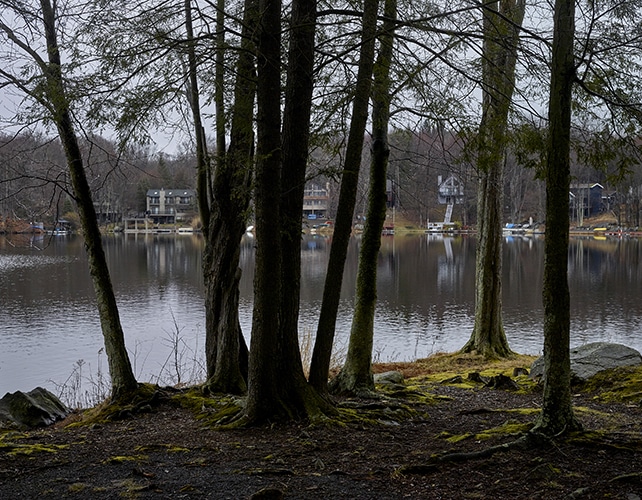The Hideout, a gated community in the Pocono Mountains of Pennsylvania, had long operated under an unspoken covenant. Whether by choice or by circumstance, the second-home owners deferred to the needs of full-time residents, a core 900 or so households.
But in 2020, “the front platers” — a pejorative for New Yorkers and New Jerseyans whose cars bear license plates on the front in addition to the rear — started to come in droves, lured to the area by a perfect storm: low-interest mortgage rates and a new work-from-home normal.
What happened next remains a fight in Pennsylvania Commonwealth Court. Many new Hideout homeowners bought their second homes with a plan to subsidize their mortgage or earn passive income by renting short-term on sites such as Airbnb and Vrbo. Unlike many newer communities, the Hideout had codified the right of homeowners to rent out their places to vacationers long before the popularity of short-term rental sites.
By February 2022, the Hideout’s seven-member homeowners association board declared that the Hideout was fully “residential.” This move was made in response to a Pennsylvania Supreme Court decision to outlaw short-term rentals in residential neighborhoods. By that June, residents voted 1,406-988 to limit short-term rentals to 10 times per calendar year.
The amendment was supposed to go into effect in January 2023, but it was suspended “due to pending litigation and on the advice of counsel,” according to the Hideout’s website. The amendment-in-limbo and pending court case have caused confusion and hurt feelings. The debate over short-term rentals sparked social media fights, at least one ejection from a meeting and the hiring of security officers to escort the leaders of the homeowners association.
Asked for an interview about short-term rentals at the Hideout, Larry Frotten, the community manager, said in a phone call that the board did not comment on ongoing litigation.
About 355,000 communities across the country are managed by homeowners associations, all laying out a complex web of founding covenants, bylaws and regulations, all somewhat dependent on shared beliefs and an agreement to follow the dos and don’ts with civility. Sometimes, that falls apart.
At its peak in 2022, the Hideout had about 322 homes registered as short-term rentals and was bringing in more than $500,000 through fees, and thousands more through the money renters were spending on food, drink and other amenities. By early 2023, short-term rentals in the Hideout were way down, and a significant number of short-term rental owners decided not to register. In May, the board reported that only 125 houses were registered, that rentals had plummeted and that they had collected only $85,000 in fees. By August, registered short-term rentals had inched up to 143, and as of March, only 115 had paid fees for 2024.
Lauren McNamee, 34, a human resources professional and owner of a short-term rental property, said the board overreacted and acted prematurely. “People are not going to the Poconos the way that they were in 2020 or 2021,” she said. “The reality is people aren’t hunkering down in the woods as much as they were. If (the board) had just let things run their natural course, bookings would have gone down on their own.”
Many other residents, however, credit the board for limiting short-term rentals. “It was out of hand,” said Gary Sangster, 65, a retired truck driver who has lived in the Hideout full-time for 30 years. “And it would have gotten worse. A lot of people agree with me and I agree with a lot people, so excuse me. We just care about our community. We don’t want to see it trashed.”
The Influx
New York City had been shedding citizens since 2016, but once the pandemic arrived, that steady migration became a stampede. New Yorkers moved north and south, many resettling upstate or by the Florida beaches, as if projected by slingshot. Others hungered to have the best of both worlds: a city rental and a house close enough to get to on weekends. Some people hoping to be second-home owners were priced out of areas such as the Hudson Valley and the Catskills, so they looked to the Pennsylvania mountains, where home prices were low and planned communities with myriad services and amenities were plentiful.
A community of 3,660 homes spread over 250 acres, the Hideout had lived up to its name. If you knew, you knew — it was the type of place people find because their grandparents retire there or friends clue them in. It has its own TV channel and its own newspaper, The Hideabout. Intended as a four-season getaway when it was created in 1970, it has several lakes, a small ski hill, a nine-hole golf course and other amenities.
At the beginning of the pandemic, homes that had once taken weeks to sell were selling in a day, said Heather Meagher, co-owner of ReMax Best, an agency that specializes in the Hideout. She estimated that “there have been over 1,000 homes sold there in the past four years, probably closer to 1,100.” In other words, since April 2020, more than 25% of houses in the Hideout changed owners.
Alana Grainsky, 38, and Cetta Puleo, 40, were among the newcomers, setting their sights on the Poconos.
In November 2020, they bought a 1,200-square-foot cabin in the Hideout for $140,000. With a 2.9% interest rate, their monthly mortgage was about $600, a cost that allowed them to keep their $1,700-a-month apartment in Jersey City, New Jersey, which they had also bought in 2020.
Grainsky was at the cabin full time while Puleo commuted back and forth, and their family and friends came to stay for Thanksgiving and the winter holidays.
“We had so many nights by the fire, grilling and having the best time inviting people up,” Grainsky said. “It felt like a place people could come, relax and retreat with us.”
But they had some regrets, too. They uncovered mold and warped wood, and water damage that caused the foundation to separate from the house. They estimated that the repairs cost them one-third of what they had paid for the property.
They decided to get a return on their investment by renting out their home on Vrbo and Airbnb.
“We put a lot of love into the house,” Grainsky said, “and I was excited to share all the things we loved about the house and the community with other people. I was also very excited at the concept of making some money off of it. There’s quite a large network of short-term rental owners. We jumped into becoming pretty active members of the short-term rental community.”
Their enthusiasm would be short-lived.
‘Get Out!’
The tension between the locals and out-of-towners became obvious to Andrew Miller, of New York’s Staten Island, in a grocery store parking lot.
As Miller, 52, and his husband stepped out of their car to stock up on groceries, they heard someone yell at them across the parking lot: “Go back to New York!”
It was a jarring moment for Miller, whose house in the Hideout was a home away from home. He was truly part of the community, serving as president of the Hideout homeowners association in 2020-21.
He was part of an earlier wave of New Yorkers who had arrived in the Hideout after 9/11, drawn by cheap housing and a close-enough commute. Miller, a senior director for New York City’s Department of Youth and Community Development, bought his house in 2002. “A friend of mine owned a home, and he decided it was time to sell and buy a condo in Florida. And I loved the house,” Miller said, so he bought it. “I was embraced in the community.”
The area is staunchly conservative; 66% of Wayne County voted for Donald Trump in the 2020 election. Yet, Miller found a foothold as a gay man. “I wouldn’t have moved here if I didn’t feel comfortable,” said Miller, who is a Republican. He and his husband, Brian Carchedi, were married in the Hideout’s Main Lodge in 2019.
Miller and, by extension, Carchedi were a big reason Grainsky and Puleo chose the Hideout. “The fact that (Miller) was an elected ‘official’ made us feel like this is a community that will be accepting to us,” Grainsky said.
“A lot of our friends, especially who are either people of color, in the queer community, or both, did express some hesitation about us moving to the Poconos, even part time,” she said.
The price made up for any hesitance they had about politics, as did the fact that hundreds of New Yorkers and New Jerseyans, many of whom carried more liberal views, had arrived in the Poconos and made their presence felt with noticeable dents in the Republican stronghold.
But the main fight wasn’t at the ballot box; it was at the grocery store. During the pandemic, part-timers, who commuted to the city, would stock up on basics such as toilet paper, taking advantage of cheaper prices in the Poconos. Full-time residents began to complain about depleted grocery store aisles and crowded amenities. There was also a growing problem that New Yorkers know all too well: limited parking.
In Facebook groups, the blame was placed on newcomers and short-term renters. “The renters are loud, profane, and obnoxious,” posted an owner in 2022. “It is horrible! Had we known what we would experience on most weekends in the summer and fall we would not have purchased our seasonal home.”
The social media grousing turned real. At a Hideout board meeting in January 2022, some homeowners started demanding amendments to the bylaws to end short-term rentals.
Frotten, the community manager, who has owned at least three properties in the Hideout since 2006 and has been a full-time resident since 2011, said the founding documents enshrined the right to rent. “We will be sued if we tell owners they cannot rent their homes,” Frotten told residents at the meeting.
A month later, however, the 4,100 residents learned via email that short-term rentals would be banned. The community’s website was also edited to describe the Hideout as a “residential” community, not a “recreational” one. The board said it got around the bylaws by basing its decision on a 2019 state Supreme Court case, Slice of Life v. Hamilton Township, in which the court upheld a lower-court decision that said municipalities could ban short-term rentals in areas zoned for family homes.
The whiplash between the January board meeting and the February email angered the short-term rental community and others who felt like the board was ruling by fiat. A vocal group began to organize, contact lawyers, start their own Facebook group and prep members for the next board meeting.
An hour and a half into the meeting, which is on YouTube, then-homeowner Christopher Reeves, 35, a construction manager, accused the board of corruption. Frotten jumped to his feet, his red tie getting stuck between his stomach and the table, and shouted for Reeves: “Get out! Get out!” A police officer and a public safety officer escorted Reeves out of the building.
When Reeves and his wife bought his home in November 2021 for $128,000, they thought they would make up the cost through short-term rentals, he said. “We did a full gut renovations. Poured all our savings into it with the expectation it was a forever investment property,” he said.
Sold
After the meeting, the board announced that it would not ban the short-term rentals outright. Instead, it proposed an amendment to the bylaw that would limit an owner’s right to rent their home to 10 times a year. It also increased the registration fees, making it more onerous and less lucrative to be a short-term rental owner.
When Grainsky and Puleo first started renting their home October 2021, they didn’t have to pay anything. Less than a year later, they paid $1,000 registration fee, plus nightly fees, starting at $150 per night and increasing with the length of the stay. Then Lake Township and Salem Township adopted short-term rental ordinances that would require homeowners to spend an additional $1,000 to register with the municipality. Every year, short-term rental owners have to renew their registration with the Hideout for an additional $500 fee and a $150 fee to the townships and an annual inspection, which, for 2024, costs $600 to complete.
Puleo and Grainsky sold their cabin in February 2023 for about $190,000, earning a profit and a lesson they will carry with them. (Reeves sold his house in March 2023.) “It just no longer felt like a safe place for us,” Grainsky said.
The couple moved to Connecticut. Their new community is not governed by a homeowners association.
c.2024 The New York Times Company. This article originally appeared in The New York Times.







